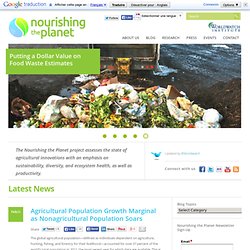

Copenhagen Consensus Center. International development, M&E, consultancy, Brighton Itad. Home - mesopartner.com. The Big Push Forward. Rosalind Eyben Rosalind Eyben is one of the co-convenors of the Big Push Forward.
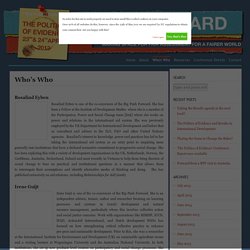
The Foundation for the Economics of Sustainability. We believe in the power of enterprise to reduce global poverty. Network for Business Sustainability - Business. Thinking. Ahead. WBCSD-SNV Alliance: Creating inclusive business opportunities by linking local communities with big business. Business works for development. About Us. Monitor helps organizations grow.
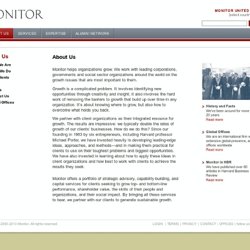
We work with leading corporations, governments and social sector organizations around the world on the growth issues that are most important to them. Growth is a complicated problem. It involves identifying new opportunities through creativity and insight; it also involves the hard work of removing the barriers to growth that build up over time in any organization. It’s about knowing where to grow, but also how to overcome what holds you back. We partner with client organizations as their integrated resource for growth. Monitor Inclusive Markets. WASTE. BRIDGE - Global Resources. Global Resources Welcome to the Global Resources Database.
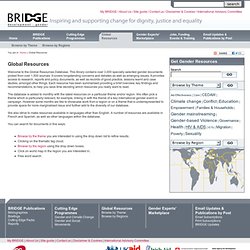
This library contains over 3,000 specially selected gender documents picked from over 1,500 sources. It covers longstanding concerns and debates as well as emerging issues. It provides access to research, reports and policy documents, as well as records of good practice, lessons learnt and case studies, amongst other things. Each resource has been summarised providing a brief overview, key findings and recommendations, to help you save time deciding which resources you really want to read. The database is added to monthly with the latest resources on a particular theme and/or region.
We also strive to make resources available in languages other than English. NYU Development Research Institute. Grantmakers for Effective Organizations (GEO) Santa Fe Institute. Poor Economics. Give a man a fish and feed him for life? Experimental evidence on the long-term effects of grants on Sri Lankan Microenterprises. Typical policies to improve the incomes of poor households and their businesses are based on the sustained provision of services – be it microfinance with multiple loan cycles and regular meetings; conditional cash transfers with regular transfers over a period of years; or business training programs which are based on the idea that capital along is not enough – as in the proverb “give a man a fish and he eats for a day, teach a man to fish and he can feed himself for life”.
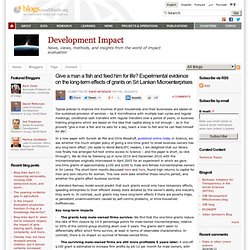
In a new paper with Suresh de Mel and Chris Woodruff, published online today in Science, we ask whether the much simpler policy of giving a one-time grant to small business owners has any long-term effect. [An aside to World Bank/IFC readers, I am delighted that our library now finally has arranged full-text online access to Science – and the paper is short, so click through!]. Gender_development_net - Home. An Agricultural Peace Dividend. In northern Uganda, home to one of Africa’s longest and most brutal civil conflicts, organic farming is producing economic growth and stability. (Illustration by Justin Gabbard) “ The hardest part is reopening the land,” says Stella Atimango, an agricultural extension worker standing in a former battle zone beside neat rows of recently planted cotton on a one-acre farm in northern Uganda. Beyond Atimango, the tiny cotton field was surrounded by an abandoned countryside, the result of two decades of fighting between the Ugandan military and the Lord’s Resistance Army.
Marginal Revolution — Small steps toward a much better world. Dalberg. Social Marketing. 2.0. Good Intentions Are Not Enough. Global Humanitarian Assistance. Eight lessons from three years working on transparency. I’ve spent the last three years working on aid transparency.
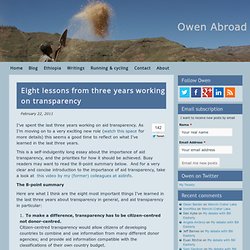
As I’m moving on to a very exciting new role (watch this space for more details) this seems a good time to reflect on what I’ve learned in the last three years. This is a self-indulgently long essay about the importance of aid transparency, and the priorities for how it should be achieved. Busy readers may want to read the 8-point summary below. DCED: Full Guide to Resources. Political Economy Analysis. Legendary Value. Independent think tank and strategy consultancy. Performance through social innovation. Making Markets Work Better for the Poor II. Market Development: Project Phases - Global documents. Participatory Market Systems Development
Global Value Chains - Publications Listing. Eco-Commerce 101 by Tim Gieseke. In Depth. Ecomagination. Www.fsg.org/Portals/0/Uploads/Documents/PDF/ADP_Rethinking_International_Development_in_a_Converging_World_2011.pdf?cpgn=WP DL - Rethinking International Development in a Converging World. Admitting Failure. The Global Campaign for Aid Transparency. Aid Effectiveness : Center for Global Development : Research Topics. The Center’s work on aid effectiveness focuses on the policies and practices of bilateral and multilateral donors. It includes analyzing existing programs, monitoring donor innovations, and designing and promoting fresh approaches to deliver aid. CGD researchers also investigate how foreign aid and other aspects of development—such as trade, migration, investment, and climate change policies—undermine or complement each other.
Specific work includes: Research, analysis, and policy outreach on U.S. foreign assistance reform through the Rethinking U.S. Foreign Assistance Program Monitoring the activities of the U.S. Comparative analysis of the three largest donor responses to the HIV/AIDS epidemic: the Global Fund to Fight AIDS, Tuberculosis and Malaria; the World Bank’s Multicountry HIV/AIDS Program (MAP); and the U.S. Research on aid in fragile states through the Engaging Fragile States project , and special analysis of the challenges confronting U.S. assistance to Pakistan .
People In Aid. CDSM Home. Food and Agriculture : Center for Global Development : Research Topics. More than a billion people in developing countries suffer from chronic hunger.
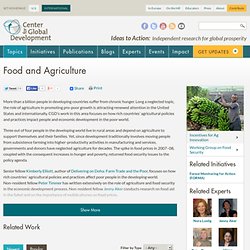
Long a neglected topic, the role of agriculture in promoting pro-poor growth is attracting renewed attention in the United States and internationally. The New Agriculturist. Welcome to Challenges Worldwide –international development and expert volunteering. Peace Through Commerce. Conflict Sensitivity. Home - Technical Centre for Agricultural and Rural Cooperation ACP-EU (CTA) Overseas Development Institute (ODI) - The UK's leading independent think tank on international development and humanitarian issues. エステナードソニック@苦情・口コミ体験談. International Development Research Centre.
Center for the Advancement of the Steady State Economy. World Agriculture. DCED. Root Capital. Changemakers. Creating Shared Value. World Business Council for Sustainable Development. Our world. Your move. Nourishing the Planet. Share By Kristen Thiel Iroko trees are native to the west coast of Africa.
